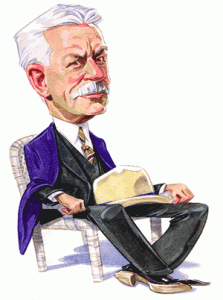Thursday

Nockian Corner
In Henry George, An Essay, Nock spent a lot of time trying to understand George. George, Nock claimed, was a first-rate philosopher and an awfully good amateur economist. Yet George also put faith in American politics and spent a great deal of time trying to change things. The fact that a man of George's mental and moral character accomplished absolutely nothing in American politics further cemented Nock in his contempt for the system, but the mere fact that George couldn't see the hopelessness of it cemented Nock's opinion of the paradox that was Henry George.
The most natural response to Nock is to point out that, by the principle of contradiction, Nock must be wrong: a first-rate philosopher can intelligently hope in politics. The syllogism runs something like this: The philosopher who believes in politics can't exist. George was a philosopher who believed in politics. Therefore, George did not exist. But we know George did exist (I've read the Wikipedia entry), and we know the second leg of the syllogism is true (Nock said so himself), and therefore the first leg is faulty.
But of course, it's not true. Politics--at least, as it exists in America--is inconsistent with philosophy, and "political philosophy" is, at a certain level, an oxymoron . . . or at least flat-out moronic. Nock explained George by distinguishing between George's "intellect" and his "temperament." George had the intellect of a philosopher and the temperament of a propagandist, and therefore part of him was naturally drawn to politics.
That's a valid distinction. As I've noted elsewhere, theologians have long pointed out that there are different faculties of the soul, which can be seen in the different functions of the mind, which I break down among the following six categories: daydreaming, unfocused thought, focused thought, meditation, contemplation, hesychia (complete stillness). It's also seen in the dichotomy in every personality: intellect and emotion. Intellect is closer to spirit, whereas emotion is closer to flesh, but both touch the soul (and the soul touches them). It's this latter dichotomy that Nock refers to when trying to explain George paradox, and it's a rational explanation.
Of course, I have no idea whether Nock was right about George because I know nearly nothing about George (my knowledge is limited to Nock's writings and that Wikipedia entry), but it is a great example of how Nock, through everyday prose, got to the guts of things.
